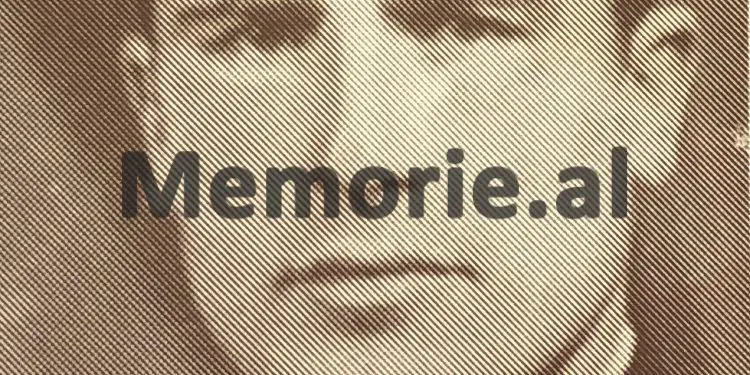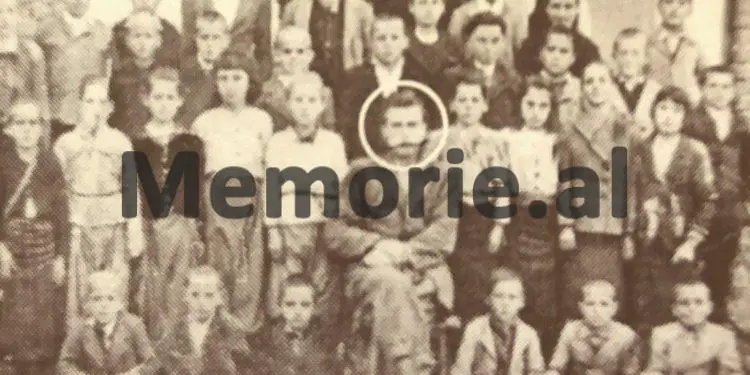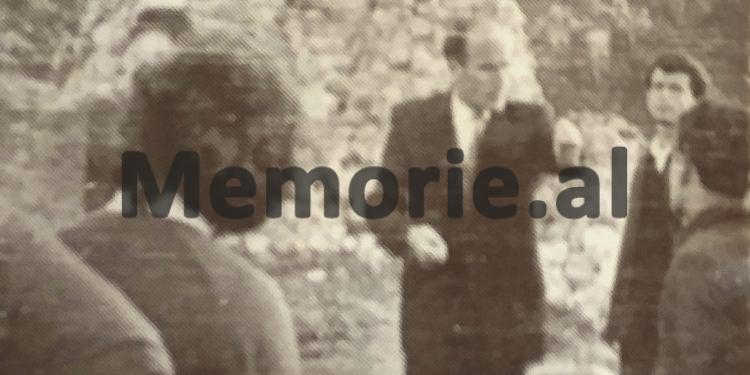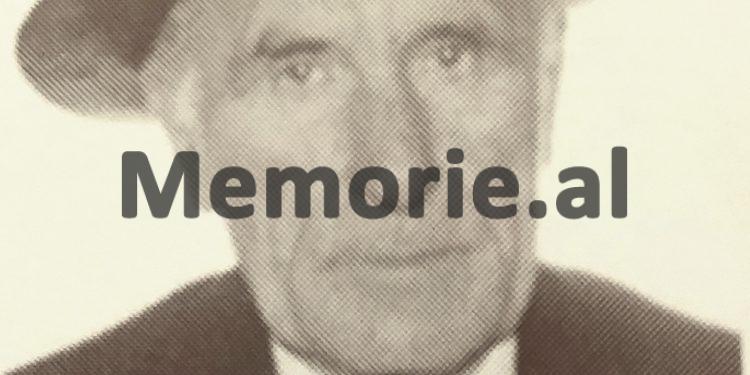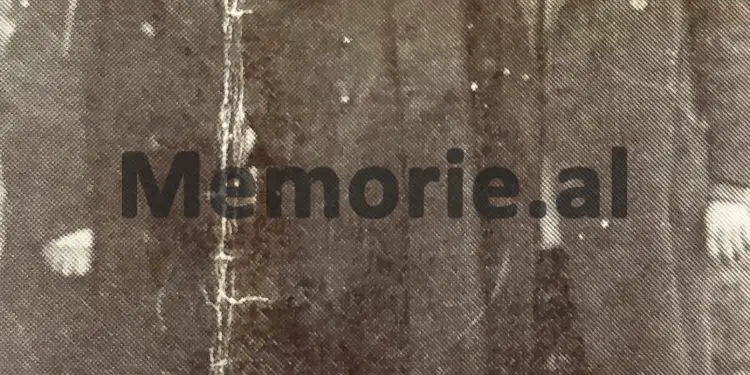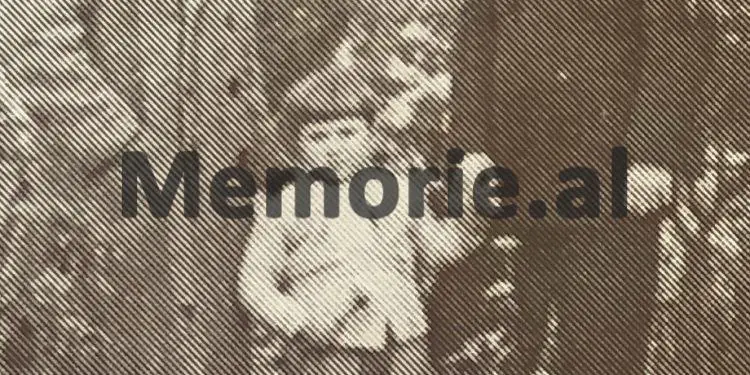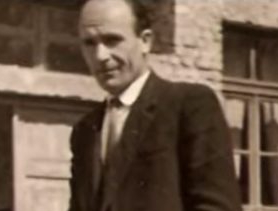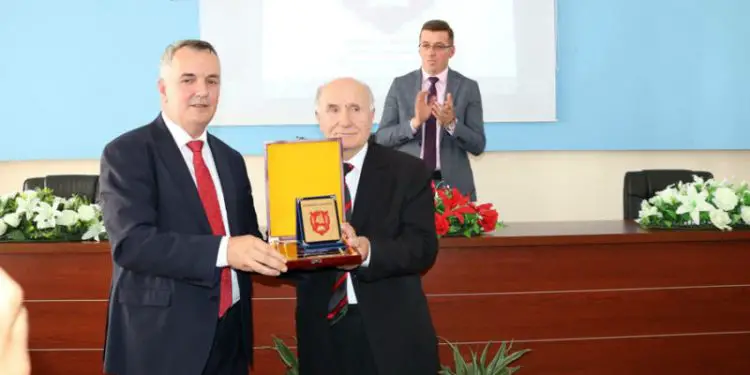Dashnor Kaloçi
Memorie.al publishes the unknown and tragic story of Kosovar immigrants in Albania, which comes through an interview with the researcher, writer and historian, Gani Ratkoceri, originally from the village of Llugaxhi near Pristina, who to escape the persecution of the Serbian regime, on October 21, 1951, he crossed the state border into the Pashtrik mountain area and surrendered to the Albanian border post. His testimony about the first contacts with the Security Officers in Kukës and Tirana, his settlement in Berat, the provocations of three Yugoslav citizens in his room at the Hotel “Tomorri”, the letter he made to Prime Minister Mehmet Shehu, the machinations of the Security Officers covering Kosovo emigration to Albania, meeting with Manush Myftiu, secret State Security agreement with UDB, mass arrests of Kosovars, as well as his conviction on charges mounted as a UDB agent, etc.
“The breakdown of relations with the Soviet Union, with which Albania had had a great friendship since 1948 when it split with Yugoslavia, greatly frightened Enver Hoxha, and he immediately rushed to declare Khrushchev a renegade of Marxism-Leninism. In those circumstances and to protect himself, Enver Hoxha was forced to soften the class struggle and make some concessions. It was at that time that I took advantage of the situation, and decided to write a letter to Prime Minister Mehmet Shehu regarding the oppression and discrimination against Kosovar immigrants in Albania. ”
This is how, among others, the well-known intellectual Gani Ratkoceri (Demiri), researcher, historian and author of many books on historical topics, who came as an immigrant to Albania in 1951. In the exclusive story for Memorie.al, he told us told the story of his life, which began with his family’s origins, his escape from Kosovo, contacts with State Security officers in Kukës and Tirana, his settlement in Berat, the provocations of three Yugoslav citizens in his room at the Tomorri Hotel , the letter made to the Prime Minister Mehmet Shehu, the machinations of the Security officers covering the Kosovar emigration in Albania, the meeting with Manush Myftiu, the secret agreement of the State Security with the UDB, the mass arrests of Kosovars, as well as his sentence with charges mounted as a UDB agent, etc.
Mr. Ratkoceri, can you tell us briefly about the origin of your family and the reasons why you came to Albania?
I was born in 1930 in the village of Llugaxhi in the district of Lipjan near Prishtina, where my family was one of the most famous in the province. After graduating from high school, at the age of 17, I was appointed a teacher in the villages of Kosovo. Having a great passion for teaching the Albanian language to young children in those areas, I served for several years in those remote villages of this province, where I was praised by the director of Kosovo Education at the time. But despite the great desire and passion I had to work in those areas, I was faced with the injustices done to Albanians by the policy pursued by the Belgrade regime. Spiritually oppressed by the injustices done to us Kosovars, I decided to flee Kosovo and come to Albania, which at the time was a dream for all of us Kosovars. At that time, one of my closest friends, Halil Bujçnica, from the village of Davidovc, was appointed a teacher in our province. At the time, I had close friends with a Junik traffic policeman named Idriz, who was a very charming and very kind boy. Idrizi trusted me a lot and told me a lot of police secrets. So Idrizi and Halili and I became close friends, and we began to talk openly with each other about the injustices of the Slavo-Communist system and, above all, about the crimes committed against Albanians. Halili and I, after being convinced that Idrizi was a patriot and ready to sacrifice everything that had to do with the liberation of Kosovo from the Belgrade yoke, decided to propose to him to carry out an assassination attempt and then the three of us to flee to Albania.
To whom would you carry out the assassination and why?
Idrizi came to me two or three times a week and taking the opportunity to measure his pulse, I said: Aman Idriz, we are only left in the midst of talk and it is not holding us back to do anything concrete for the freedom of Kosovo. . Without finishing his speech, Idrizi told me: “Listen Gani, I am ready to sacrifice myself for the cause of Kosovo, even with my life.” After that, I spoke openly to him, saying: I thought that you, Halili and I, would assassinate the head of the UDB and the two heads of government, and flee to Albania. I know the border well because I was a teacher on those sides and we will have no problem escaping.
How did Idrizi react, did he accept your plan?
Idrizi agreed to carry out the assassination, and after we met with Halili, we decided to do it in Lipjan or in our school in Godonc. At that time, local government elections were called and election campaigns began. This gave us wings, because what we had planned to kill with the assassinations would definitely come to our village. In those days when we were waiting to carry out the assassination attempt with the weapons that I had taken in my house, I met with Professor Zekeria Rexha, whom I had a friend, and I presented all our plan to him.
How did Professor Zekeria react?
The professor told me that this should not be done in any way, as the UDB would find a cause and strike mercilessly, making reprisals and arrests, and the damage would be incalculable. After that we obeyed and did not perform the action we had been thinking about for some time. After we decided not to carry out the assassination, I returned home with the weapons I had taken, at the end of the school year. But out of carelessness instead of going straight home, as I was with a rifle in my hand, I set off for the school where I had to hand over the school courier keys. Someone had seen me and reported me to the police, who sued me and took me to court where I was sentenced to one year in prison. Taking advantage of the fifteen days I was left to appeal, I decided to flee to Albania. When I got home, I told my father about my sentence and my plan to escape. After hearing me, my father said to me: “Good son, think only of yourself, for I will face all the difficulties that will come my way with the government, which will not be few. Ask them to honor me wherever you go. I ask for this not only for the family, but for the whole of Kosovo ”.
What are the vicissitudes you encountered on the way to the Albanian border?
Regarding this question, in parentheses I am telling you that: the area from Prizren to Albania was declared a border area and if they caught you without permission of the Internal Affairs Section, they would accuse you of attempting to escape and punish you very severely. On October 21, 1951, I set off in a suitcase with clothes in hand, climbing Mount Pikllima, which was covered in snow. I had with me a large coat and a suitcase, and a pair of shoes. From the rain that started to fall, the big coat became very heavy and after I took a shirt out of the suitcase, I threw the coat and the suitcase in the abyss. With great difficulty I crossed the border and as soon as I approached the Albanian pyramid, I sat down and kissed the free land of Albania. When I went down to the top of Pikllima, it was dawn and the top of Pashtrik was visible. From that I understood that I had left behind Korritnik and I was convinced that I had entered the territory of Albania.
Where did you go next?
I went downstairs to Korritnik to the village of Morina, and there I saw a large slogan that read, “Long live the friendship with the Soviet Union.” It was early in the morning and the villagers had just started to graze their cattle. I asked a shepherd, where the chairman of the council was, and I went straight there. As soon as I knocked, the door opened and a middle-aged man came out, who kindly invited me inside. I told him that I was looking for the mayor and he replied that he was the mayor himself. Involuntarily, I went inside and as soon as the conversation started, I told him that I was not coming from Kukes, as he thought, but I was coming from Kosovo, after I had crossed the border. He jumped to his feet and hugged me, telling me that: thank goodness I had escaped, without getting a thorn in my side. After giving me food, he told me that he would help me with everything I needed, both in Kukës and in Tirana. After that we went out and left for the border post together with a friend of his named Haziz.
Where did you go with them?
In the direction of the post office and when we approached, the border guards, as soon as they saw the two people accompanying me, allowed us to enter immediately. There the post commander, after looking me in the head and feet, became curious to know where I had crossed the border. When I told him where I had gone to Mount Pikllima, he hugged me and wished I had survived, as the whole place had been mined and there was no way to be guarded by soldiers, neither in summer nor in winter. Then he started asking me about some military problems and kept notes, he said to me: “Do you know that you are the first man since July 1948 to cross the border in this area” ?! He then explained to me that from Vërmica to Brezne, the territory was very narrow. While Korritnik was considered impassable by the Yugoslavs. At around 13.00 he gave me a soldier to accompany me and started me on foot to the Internal Affairs Branch of Kukës.
How were you received at the Kukes Branch of Internal Affairs and what did the Security Officers ask of you?
My arrival at the Kukës Internal Affairs Branch had been announced before, and when I went there, a young and polite officer received me. He took me to the hotel, where the room had already been ordered, and in my presence, told the person in charge: “Comrade Gani is a Yugoslav immigrant. He will sleep in a hotel and eat in a restaurant. We will pay the money. ” I was sorry for the presentation made by the officer and said: Comrade officer, I am not a Yugoslav immigrant, but an Albanian. The officer replied, “What are you, the party knows,” and left without greeting me. That night I slept in a hotel, and the next morning a policeman came and picked me up and sent me to the officer who had called me a Yugoslav immigrant. I greeted him coldly as he got to his feet and hugged me. After inviting me to sit down, he put the “Diamond” cigarette pack in front of me and smiled at me, as if nothing had happened. After that he told me: “My name is Kapllan Sako. I am a State Security officer and I am originally from Gjirokastra. We will have work together. I want you to answer me in detail and responsibly about everything I ask. Be careful, these answers will follow after a lifetime. One more thing you need to know, that we have the opportunity to verify what you are going to tell us, and if something is not true, you will be held criminally liable”.
How did you respond?
After his words, I replied: I will only tell you the truth and I will bear criminal responsibility as you wish. After my answer, he replied, “Not us, but the Party.” After that, in three days, I started providing information on the economic and military situation in Yugoslavia and Kosovo. After staying for three or four days in Kukës, they brought me to Tirana, where they assigned me to live in the city of Berat, where from the first day, I had an incident with some UDB agents, who had been introduced by the Security of The state to provoke me.
Where were they settled in Berat and what were those who were provoked, that you call them UDB agents?
In the city of Berat, I was accommodated in the hotel-tourism “Tomorri”, where the waiter had immediately opened his mouth, because a Yugoslav immigrant had come there. From the first day in the morning, the door knocked on my door and without inviting them, three tall Montenegrins like oaks entered me and greeted me in their own language. They were called Bashko Ivanovic, Zivko Dashovic and Stevan Perovic. Stevan was a Catholic Albanian from Tuzi and he spoke Albanian very well, while the other two did not know him at all.
What did they tell you and who sent them?
Stevani was the first to speak, addressing me: “You, comrade Gani, are as young as I am. Of course, we as young people are wrong not to recognize Albania. That is why we have come to help you, especially Comrade Bashko and Comrade Zhivko. First of all, you should know that here in Albania, by order of the Central Committee of the ALP, the Yugoslav emigration organization was established, headed by the honorable comrade and great revolutionary, Jolo Markovic. This organization has council members wherever there are Yugoslav immigrants. For the district of Berat, these friends are here. The organization’s council also published a newspaper in Serbo-Croatian, dealing with the events in Yugoslavia and the socialist camp led by the Soviet Union, led by Comrade Stalin. This council cooperates with the Central Committee and the Security of the Government, and has full powers over them. That is why you, too, speak openly to us about your life, about your work, and above all about who sent you, that perhaps out of fear, you did not dare to tell the State Security. So tell us to tell the Security and nothing will happen to you. Don’t take it as an insult, because that’s what happened to me, who was sent to me by the UDB and I was afraid to tell the State Security.
How did you react to that provocation, or rather the open accusations they made against you by calling yourself the man who was sent to you by the UDB ?
Their provocation did not last long, as the climax was when Stefani told me to confess in front of them that the UDB had sent me on a mission. At that moment, I could no longer control myself, and I got to my feet, hitting him hard in the face with my palm, so that he immediately collapsed to the ground. After that, I immediately left the room and left in the direction of the Internal Affairs Branch, to appear there, according to the instructions given to me in Kukës. There I requested a meeting with the Branch President, Zylfi Sali Lamin, to whom I told the whole scene what happened to the three Montenegrin citizens.
How did the Branch President respond?
The chairman of the branch, Zylfiu, received me very well and said: “Why didn’t you shoot him in the head” ?! He then told me that he loved and respected Kosovars very much. He helped me, appointing me as a teacher in Berat, according to the orders he had received from Wilson Pecani, the man in charge of the Political Bureau for Kosovo Immigration in Albania.
At the time you came to Albania, how were Kosovar emigrants treated by the communist regime treated?
In parentheses of your question, I wanted to tell you that at that time, by order of Enver Hoxha, a propaganda for the national cause began to be made, and the figures of the Albanian National Revival began to be evaluated. Taking advantage of that situation, I decided to write a letter to Prime Minister Mehmet Shehu regarding the Kosovar emigration to Albania, which was sent to internment camps.
Where did you get that information from, that is, with the reality where Kosovar emigration was in Albania?
At that time, I had met some compatriots from Kosovo or others, and in conversations with them I had created a clear idea of the conditions under which Kosovo emigration to Albania took place. Also, before I wrote that letter, I had in mind the decision of the Albanian government not to give scholarships to Kosovar students, because they would get out of trouble from the Yugoslav embassy in Tirana.
Before you wrote that letter, did you consult with anyone, or did you decide for yourself?
I told Ajet Haxhiu my idea for the letter and asked them to write to both of us and address it to the Central Committee of the ALP. The verse not only did not support my idea, but also advised me not to do such things that I would have serious consequences. Although he refused, I wrote a letter to Prime Minister Shehu, asking for a meeting to discuss the national issue.
Did the Prime Minister respond to you?
He replied, “Comrade Gani, I received your letter, but I am very busy. Write to me because I will answer you. ” Inspired by this answer, I wrote him another letter, in which I presented some points regarding the Kosovar emigration to Albania, and asked them to be given the right to study and work. I also wrote that: The Institute of History should rewrite the history of Albania, not according to Serbo-Russian sources, the problem of orientation of the Writers’ League towards Kosovo, the Albanian press and Radio-Television that should broadcast songs and shows of Kosovo, etc. I started this by mail, without telling anyone. After two weeks, I was called to the Ministry of Education, where I was received by Minister Manush Myftiu.
What did you discuss at the meeting with Minister Myftiu?
In his office we discussed many things, and one of them was what he told me, that I should personally go to the internment camps, and register all the Kosovars who were there. I replied that I could not do it, telling her that there was a competent body for this (for the Ministry of Internal Affairs), as I would break the “status quo” that she had given me. He was outraged by my response and told me that he, as a minister and deputy prime minister, authorized me to do so. I also told him that the Yugoslav anti-Tito immigrants had been publishing their newspaper, Za Slobodu, since 1948, which treated the topic of Kosovo almost nothing. We Kosovars had to publish our newspaper, entitled “Kosova”.
How did Minister Myftiu respond to your idea of publishing a newspaper called Kosova?
He told me that: this could not be done for now, as Kosovo would initially be treated as a topic in the Albanian press and radio.
In the late 1960s and early 1970s, it is already known that there was a softening of Tirana’s official relations with Belgrade, from which we are saying that Kosovo also “benefited”. How would you comment on this time period?
In this period, as you say, Enver Hoxha’s policy was in unison with that of Serbia, as official Tirana made some concessions, allowing Kosovar groups and individuals to come as tourists to Albania. The exchange of intellectuals and professors of the two universities, Tirana and Pristina, was also achieved. At the height of this political situation, at a meeting of the Central Committee of the ALP, the Secretary for Foreign Relations, Pirro Bita, said: “Although individuals and groups of Kosovars will continue to come to Albania, let’s not forget that they live in a revisionist country and that they have been educated with that ideology. Likewise, Kosovars who came to Albania after 1948 have been plagued by revisionist ideologies. The latter are very dangerous because they live between the people and our society, which is predisposed to be influenced by foreign ideology. Therefore, we must be as vigilant as possible, and inform the competent bodies and those of the Party about everything. You know we’re dancing in the wolf’s mouth. ” Following this meeting, the Central Committee of the Albanian People’s Party ordered the arrests of all suspected Kosovars in Albania, and those who would try to come here, not to meet with their patriots, and especially with locals, while their contacts were very limited. During this time period, two senior officials of the Ministry of Internal Affairs, who had worked for Kosovar emigration, were fired.
Can you tell us who they were and why they were fired?
They were Skënder Backa, (an excellent man with a very good family, originally from the village of Backë in the Skrapar district) and Wilson Pecani. The dismissal of these two, and especially of Skënder, was a drama for us Kosovars in Albania, as he did not allow the arrest and deportation of these immigrants.
Who were appointed in their place?
In their place, by order of Kadri Hazbi, Shaban Braha was appointed, who was given political and economic powers in this sector. He had the right to arrest, imprison, or deport any Kosovar, as well as to allow or not to receive scholarships and study rights for them. He also made decisions on whether or not to provide housing, etc.
What were the reasons for the dismissal of Skënder Backa and Vilson Pecani?
Skënder Backa’s dismissal came as a result of an improvement in relations between Tirana and Belgrade. The UDB itself had made it a condition that Skender leave the post, as the Belgrade newspaper Borba published two articles by Backa, in which it described him as an enemy of Yugoslavia. Thus, all Kosovars who were arrested after 1970 have been arrested by order of the UDB, and I have a lot of documents for this and I will make them public in a second time.
How was the agreement between Albania and Yugoslavia implemented?
Under the conditions set by Yugoslavia for Albania, all books by Kosovar authors that dealt with Belgrade’s criminal policy towards Kosovo were removed from circulation. One of these novels was “The Betrayal” by Kapllan Resuli, which at that time caused a great stir among Albanian readers. This novel had to be removed because it betrayed the great betrayal of the Communist Party of Yugoslavia, and that the book was published by order and approval of Skënder Backa. But in order to remove the novel “Betrayal”, its author, Kapllan Resuli, had to be arrested, and for this, in order to appear before the Ministry of Internal Affairs as diligently and as faithfully as possible, Shaban Braha staged a ” extremely dangerous hostile group ”allegedly led by Kapllani himself.
Who else was part of this “hostile group”?!
This “anti-party group” consisted of Myrteza Bajraktari (a true patriot from Gostivar), Fazlli Ramadani (from Gjilan), and the talented painter Sadri Ahmeti. The group was arrested with great fanfare, and the State Security Service said it had arrested a very dangerous Yugoslav intelligence group that was trying to overthrow the People’s Power. Likewise, the State Security circulated rumors that Kapllan Resuli’s alleged novel “Treason” had in fact been made by the UDB, and that he had only signed it. Shaban Braha and his associates, Sali Shatri, and Omer Mekuli, began fabricating witnesses to the group, whose members were sentenced to life in prison.
After the sentencing of this “group”, were there any other sentences against Kosovar immigrants in Albania?
After this “group”, the fury of the arrests of Kosovar patriots in Albania began. At that time, Shefqet Kaçaniku and Esat Myftari in Lezha, Nuro Hoti and Arben Çeta (Anton Çeta’s brother), a doctor in Durrës, Qazim Kreka, Jetulla Gashi, Shefqet Rexha, Riza Marevci, Isuf Visoka, were arrested and convicted. and Zeqir Rashti in Elbasan, Hysen Bukoshi and Idriz Zeqiraj in Berat, Ibish Kelmendi and Rexhep Llazana in Fier, Ymer Llugaliu, Rexhep Ahmeti and Kole Nikshiqi in Mirdita, and dozens of other Kosovars who would fall prey to the agreement. covert between State Security and UDB. It is understood that this agreement was not signed with protocol as official agreements are made, but it was a tacit agreement between official Tirana and Belgrade, as the communists and totalitarian and dictatorial governments knew how to do when they needed it.
Mr. Gani, a few years later your arrest and sentencing took place. Can you tell us how and why you were arrested?
Around 1972, the Ministry of Interior called urgently to Tirana, the operative Myfit Maliqi, who at that time was working in the Saranda ravine. Myfiti himself has told me that the Director of the Internal Directorate of Tirana, Pilo Shanto, told him: “Myfit, you have not brought us any material for the anti-party group of Gani Ratkoceri for three years”? He then ordered Myfit to prepare my arrest warrant, but Myfiti objected, saying: Gani should not be arrested, as he works honestly and we have no compromising facts about him. Later, Pilo Shanto himself was of this opinion. Myfiti told me that Kadri Hazbiu himself had told him that: you did very well not to sign the arrest warrant for Gani Ratkocer, that I was of the same opinion. But that thing was on order from above. Knowing that I was under surveillance by the State Security, I volunteered to leave Tirana and go north. But there, what did not happen in 1972, became a reality in 1978, after I was arrested when I was a teacher in Mirdita and sentenced to 10 years in political prison on charges of “agitation and propaganda against popular power”, which did not stand. not at all and all were mounted by the State Security.
Did you try to claim your right?
Ever since I was in prison serving my sentence as an “enemy of the people”, I have continued to write letters to the President of the Supreme Court, Aran Çela, asking for my innocence. Back in 1983-1984, after Enver Hoxha had hit the group of Mehmet Shehu and Kadri Hazbiu, by order of the Politburo, the request for innocence of a small group of intellectuals who had been unjustly convicted was considered. In this context, my request was reviewed, and the President of the High Court, Aranit Çela, acquitted me, where, among other things, it was written: “From what we presented above, the attack on Gani Ratkocer was ordered by the UDB.”/Memorie.al




